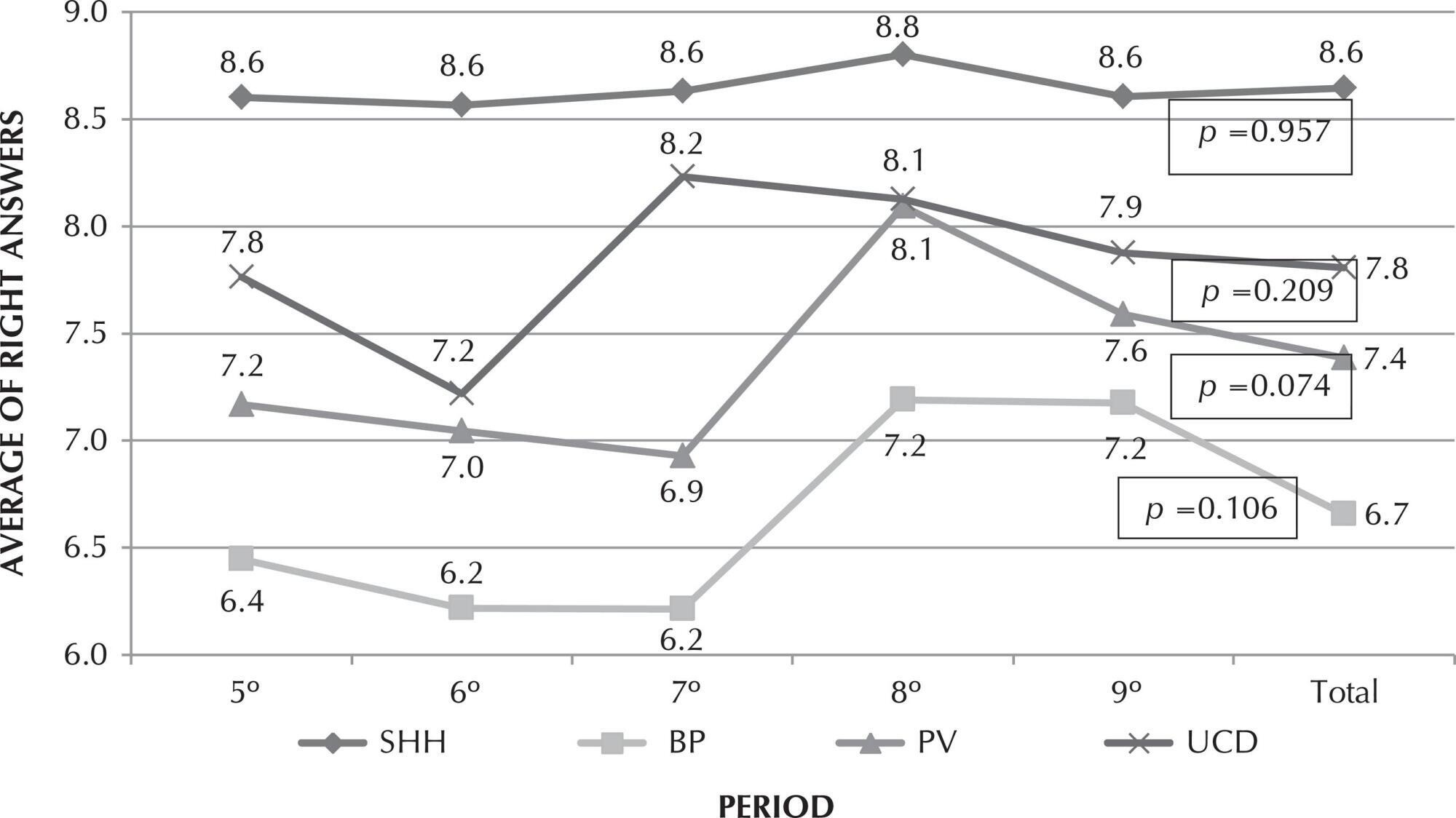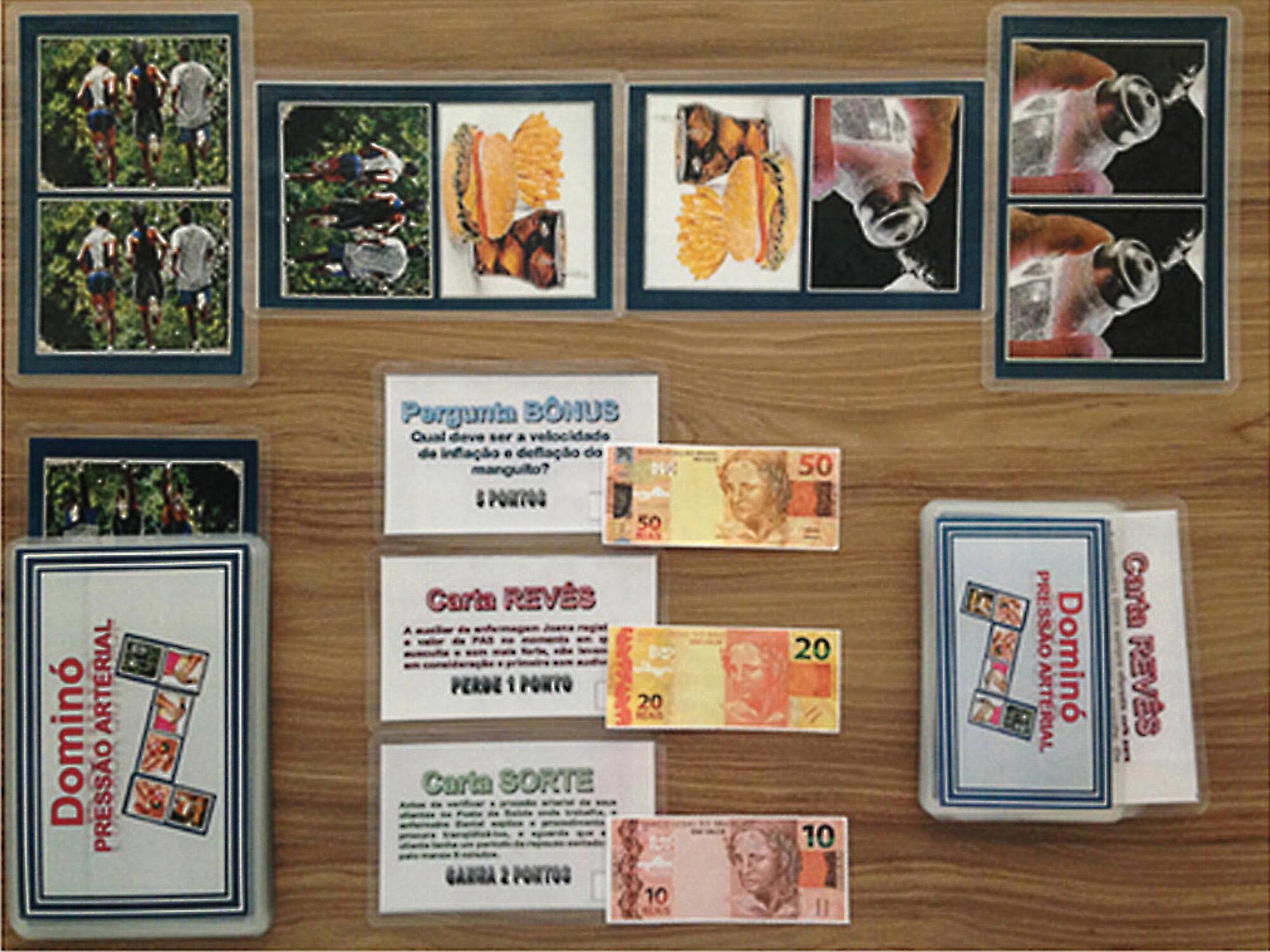-
REVISÃO
Health promotion programs in higher education: integrative review of the literature
Revista Brasileira de Enfermagem. 2018;71(suppl 4):1714-1723
01-01-2018
Resumo
REVISÃOHealth promotion programs in higher education: integrative review of the literature
Revista Brasileira de Enfermagem. 2018;71(suppl 4):1714-1723
01-01-2018DOI 10.1590/0034-7167-2016-0693
Visualizações0Ver maisABSTRACT
Objective:
to characterize the interventions of health promotion programs implemented in Health Promoting Universities; to analyze the results of the interventions of health promotion programs.
Method:
integrative review carried out in EBSCO, PubMed, SciELO, Scopus and Web of Science. Articles published between 2000 and 2014 were selected, with evidence of health promotion intervention programs and evaluation of results. Results: 17 articles were included. The health promotion programs aimed at increasing the welfare of students, with an emphasis on physical activity, sexual health and on improving the environment of health support within the university community.
Conclusion:
health promotion strategies in an university context do not always result from the convergence between educational, political, legislative or organizational actions that support lifestyles and conditions which are favorable to the health of individuals or groups, and that contribute to improving the physical and social environment.

-
EXPERIENCE REPORT
Community intervention in the Nursing education: experience report
Revista Brasileira de Enfermagem. 2018;71(suppl 4):1774-1778
01-01-2018
Resumo
EXPERIENCE REPORTCommunity intervention in the Nursing education: experience report
Revista Brasileira de Enfermagem. 2018;71(suppl 4):1774-1778
01-01-2018DOI 10.1590/0034-7167-2017-0351
Visualizações0ABSTRACT
Objective:
To report the implementation and results of community intervention projects used as a strategy for teaching and developing people and communities in the training of community health nursing specialists at the Centro de Formação de Saúde Multiperfil (Multi-profile Health Training Center), Angola.
Method:
Report of experience of the use of community intervention projects in nursing.
Results:
Community intervention projects have contributed to the learning of students and to the promotion of health, citizenship and the empowerment of individuals and communities. Its implementation is in the fourth year, and 16 projects have already been developed in 2 distinct neighborhoods, and this year the intervention will cover a third.
Conclusions:
Nursing teaching should adopt strategies that lead the student not only in the path of professional autonomy, but, above all, in the empowerment of people and communities. Community intervention is undoubtedly important in this area.
Palavras-chave: Community Health NursingCommunity Health PlanningEducation in NursingEmpowermentHealth EducationVer mais -
EXPERIENCE REPORT
Death education: sensibility for caregiving
Revista Brasileira de Enfermagem. 2018;71(suppl 4):1779-1784
01-01-2018
Resumo
EXPERIENCE REPORTDeath education: sensibility for caregiving
Revista Brasileira de Enfermagem. 2018;71(suppl 4):1779-1784
01-01-2018DOI 10.1590/0034-7167-2017-0018
Visualizações0Ver maisABSTRACT
Objective:
to report the application of a participatory teaching-learning method on the themes death, dying, and associate care to highlight its applicability to the students.
Method:
report of application of participatory method in 22 students from the 6th period of the undergraduate program in Nursing and Obstetrics of a public university. The first stage focused on personal experiences of the students and the second on professional prospects. As resources for data collection we used music, drawing, drama, and photography.
Results:
after applying the method, the students assigned meanings to death and nursing care, reflected, criticized, and resignified experiences on the theme.
Conclusion:
the method was considered applicable and effective to achieve the objective, that is, it enables learners to act as protagonists of the teaching-learning process, building together a new perspective of end-of-life care.
-
EXPERIENCE REPORT
Clinical simulation to teach nursing care for wounded patients
Revista Brasileira de Enfermagem. 2018;71(suppl 4):1785-1790
01-01-2018
Resumo
EXPERIENCE REPORTClinical simulation to teach nursing care for wounded patients
Revista Brasileira de Enfermagem. 2018;71(suppl 4):1785-1790
01-01-2018DOI 10.1590/0034-7167-2017-0170
Visualizações0Ver maisABSTRACT
Objective:
to report the experience of constructing and applicating clinical simulation scenarios for the evaluation and treatment of wounds.
Method:
experience report on two simulation scenarios for nursing care of wounded patients applied to nursing undergraduates. We structured simulations based on the model from the National League for Nursing/Jeffries Simulation Framework. The scenarios were evaluated by the instrument Simulation Design Scale and the students by the experience with the simulation.
Results:
the scenarios reproduced nursing care situations with the application of role play and moulage, which allowed us to evaluate and discuss the wound treatment. Reflections on the debriefing were important for the teaching-learning process and association between theory and practice, these factors determined the satisfaction of students with the activity.
Conclusion:
using clinical simulation scenarios to teach students favored the clinical reasoning and decision-making in the evaluation and treatment of wounds.
-
REFLECTIVE
Ethical competences for the development of nursing care
Revista Brasileira de Enfermagem. 2018;71(suppl 4):1810-1814
01-01-2018
Resumo
REFLECTIVEEthical competences for the development of nursing care
Revista Brasileira de Enfermagem. 2018;71(suppl 4):1810-1814
01-01-2018DOI 10.1590/0034-7167-2017-0539
Visualizações0Ver maisABSTRACT
Objective:
To present an analysis of the nursing ethos based on the disciplinary foundations of nursing to propose a definition of ethical competences for nursing training.
Method:
The present proposal is a theoretical reflection, based on a literature review of the specialty, both nursing and ethics.
Results:
we suggest basing the ethical education of nursing students integrating transversally disciplinary, bioethical and civic ethical competences, considering certain educational dimensions that favor their development.
Final considerations:
We expect that the definitions of three competences of the moral scope of nursing, contribute to cross-cutting proposals that promote the values and principles of the profession.
-
RESEARCH
Semiotics and semiology of Nursing: evaluation of undergraduate students’ knowledge on procedures
Revista Brasileira de Enfermagem. 2017;70(2):249-256
01-01-2017
Resumo
RESEARCHSemiotics and semiology of Nursing: evaluation of undergraduate students’ knowledge on procedures
Revista Brasileira de Enfermagem. 2017;70(2):249-256
01-01-2017DOI 10.1590/0034-7167-2016-0417
Visualizações0ABSTRACT
Objective:
to assess the knowledge of scholars on Nursing regarding simple hands hygiene (SHH), blood pressure measurement (BP), peripheral venipuncture (PV) with venous catheter and male urethral catheterization delay (UCD) procedures.
Method:
quantitative study carried out between February and May 2014, with 186 undergraduate Nursing students from 5th to 9th period of a public university of Rio Grande do Norte, with application of four questionnaires. One carried out descriptive and analytic analysis.
Results:
the students presented low average percentage of right answers, especially in blood pressure measurement (55.5%); SHH's average was higher than 70%. The average of correct answers was the highest in SHH (8.6), followed by UCD (7.8), PV (7.4) and BP (6.7). The questions regarding the topic "concepts" showed less correct answers when comparing it to the topic "technique steps".
Conclusion:
it is necessary to establish knowledge monitoring strategies, in order to stimulate the constant improvement.
Palavras-chave: Education in NursingKnowledgeNursing CareResearch in Nursing EvaluationUndergraduate Nursing StudentsVer mais
-
RESEARCH
Revalidation of game for teaching blood pressure auscultatory measurement: a pilot study
Revista Brasileira de Enfermagem. 2017;70(6):1159-1168
01-01-2017
Resumo
RESEARCHRevalidation of game for teaching blood pressure auscultatory measurement: a pilot study
Revista Brasileira de Enfermagem. 2017;70(6):1159-1168
01-01-2017DOI 10.1590/0034-7167-2016-0578
Visualizações0ABSTRACT
Objective:
To adapt a pre-existing educational game, making it specific to the teaching of blood pressure auscultatory measurement, and to apply this game in a pilot study.
Method:
The original game cards were altered by the authors and submitted to content validation by six experts in the field. After redesigns, the game was applied to 30 subjects, who answered a questionnaire (pre-test and post-test) on auscultatory measurement. Data were analyzed descriptively and by the paired Student's t-test and paired Wilcoxon test.
Results:
Throughout the content validation process, 17 of the 28 original cards were modified. Of these 17 cards, 13 obtained 80% agreement, and the rest were modified according to the judges' suggestions. The obtained grades significantly increased between pre- and the post-test.
Conclusion:
It was concluded that the reformulated game presented satisfactory evidence of content validity. Its use as a teaching-learning method was effective for this sample.
Palavras-chave: Determination of Blood PressureEducation in NursingEducational TechnologyExperimental GamesGames and ToysVer mais
-
REFLECTIVE
Theory of communicative action: a basis for the development of critical thinking
Revista Brasileira de Enfermagem. 2017;70(6):1343-1346
01-01-2017
Resumo
REFLECTIVETheory of communicative action: a basis for the development of critical thinking
Revista Brasileira de Enfermagem. 2017;70(6):1343-1346
01-01-2017DOI 10.1590/0034-7167-2016-0383
Visualizações0Ver maisABSTRACT
Reflections on some assumptions of the theory of Communicative Action and the development of Critical Thinking in the context of training students in undergraduate nursing courses. The perspective is based on concepts of Jürgen Habermas, as a possibility for the development of critical thinking among the students of these courses. Communication is therefore understood as inherent in the training of nurses in a continuous, dynamic, dialogical process, with interventions that are related to the context of the students and that have meaning for them, in order to contribute to the promotion of Critical Thinking.




